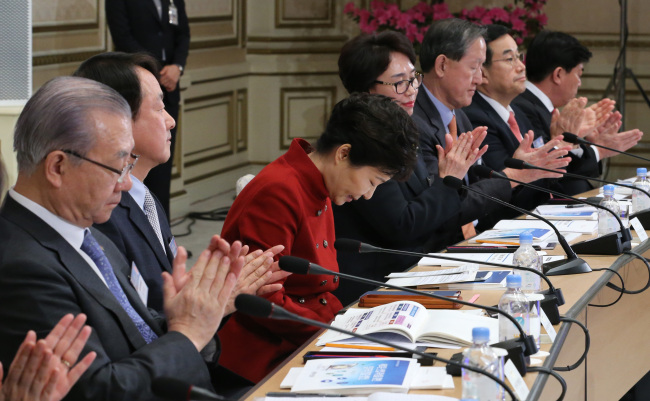Responding to concerns that heightening tensions in the peninsula may deliver a blow to South Korea’s economic climate, President Park Geun-hye on Wednesday vowed to rev up exports through a series of deregulations for corporate investment in new businesses.
The state leader implied that the recent military provocations from North Korea and the consequent diplomatic uneasiness with China are to have limited effect on the nation’s economy. The opposition bloc, however, refuted that the administration had incurred the current national security crisis upon itself, without taking due responsibility.
“The level of uncertainty has surged recently, due to the slow growth of the global economy, the plunge in oil prices and the financial market strains in China and Japan,” Park said at a trade investment promotion meeting.
“But it is in such unstable times that we should move forward and let the world know that our economy, as well as our national security situation, is well in order.”
For this, it is crucial to induce investment into promising business sectors and to expand the role of the private sector in export strategies, Park said.
 |
| President Park Geun-hye responds to applause after speaking at the trade and investment promotion conference in Seoul on Wednesday. (Yonhap) |
In support of her words, the Ministry of Trade, Industry and Energy presented a plan to lift regulations and encourage companies to invest 44 trillion won ($35.8 billion) in new technology sectors such as electric car over the next three years.
The key motive of these deregulations is to prop up the falling trade volume with neighboring China.
Ministry data showed that South Korea’s exports to China stood at $9.5 billion in January, down 21.5 percent from the previous month, a change mostly attributable to China’s growth deceleration.
Also adding challenge on the Korea-China trade horizon is the possible deployment of an advanced U.S. missile defense system to South Korea.
In the wake of North Korea’s nuclear and missile tests, the South Korean Defense Ministry has recently said that it is considering the allocation of the Terminal High Altitude Area Defense system as a defensive measure.
This has triggered visible backlash from China, which claimed that the antiballistic missile system could target its mainland.
Zhang Yesui, China‘s executive vice foreign minister, said Tuesday that he delivered Beijing’s disapproval of THAAD to his South Korean counterpart Lim Sung-nam.
Despite a disgruntled China, however, President Park outspokenly condemned the North and its military moves, displaying a hard-line stance that further supported Seoul’s deployment of THAAD.
The strongly worded message led to worries that Korea’s No. 1 trade partner may carry out trade retaliation or other measures in protest.
In 2000 when the South Korean government raised the tariff rate on imported garlic, China immediately fought back by banning the import of Korean mobile phones and polyethylene. South Korea, taking a blow in its $500 billion export market, soon gave in and lowered back its tariff.
The government nevertheless claimed that China’s disapproval of THAAD would not directly affect its economic ties with Korea.
“Diplomatic strains tend to have limited influence on the economy,” said Deputy Prime Minister and Finance Minister Yoo Il-ho, after the Defense Ministry announced the THAAD deployment plan.
He also claimed that Korea‘s economic condition is relatively favorable, c
ompared to other countries.
But the opposition camp pointed out that the government, despite its e
ncouraging tone, may have to worry about the negative consequences.
“China has often carried out restrictive measures when faced with undesirable economic situations,” said Kim Jong-in, interim chief of The Minjoo Party of Korea on Tuesday.
“The government should face the fact that national security troubles may lead to social and economic conflicts.”
Global credit ratings agency Moody’s said in its recent report that the closure of the inter-Korean industrial park in Gaeseong is a negative variable for South Korea’s credibility.
The Ministry of Strategy and Finance, however, claimed that the agency placed more focus on Korea‘s strong fundamentals and that it maintained the country’s credit rating at the positive Aa2 level.
By Bae Hyun-jung (tellme@heraldcorp.com)

